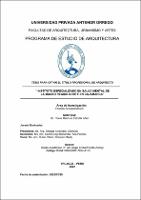Mostrar el registro sencillo del ítem
Instituto especializado en salud mental de la macro región norte en Cajamarca
| dc.contributor.advisor | Padilla Zuñiga, Angel Anibal | |
| dc.contributor.author | Flores Rabines, Estrella Ishid | |
| dc.creator | Flores Rabines, Estrella Ishid | |
| dc.date.accessioned | 2023-02-22T13:28:30Z | |
| dc.date.available | 2023-02-22T13:28:30Z | |
| dc.date.issued | 2023 | |
| dc.identifier.uri | https://hdl.handle.net/20.500.12759/10341 | |
| dc.description.abstract | En los últimos años, las enfermedades mentales han ido aumentando a nivel mundial y especialmente en el Perú debido a su alta prevalencia en los trastornos mentales de 37,3% para Lima Metropolitana, y de 39,3% en ciudades de la sierra1 entre los cuales existe una población oculta que no pide ayuda ya sea por carencia de recursos o por ser parte de un estigma social, donde discriminan y denigran a las personas que poseen algún trastorno, u inclusive creen que solos pueden superar una enfermedad psíquica, aludiendo a que ‘todo está en la mente’, pero se olvidan que la mente es la expresión funcional del cerebro. Así es como el proyecto de tesis se convierte en un desafío, tomando una problemática social que cada día genera más demanda, no sólo por el aumento progresivo que han sufrido las enfermedades mentales, sino también por la incipiente implementación de los hospitales psiquiátricos actuales, que son guiados de doctrinas basadas en el encierro y aislamiento, existiendo actualmente nuevos métodos para reinsertar y rehabilitar al paciente como parte de nuestra sociedad, designándoles un lugar apropiado tanto espacial como sensorial que promueva y potencie un progresivo reencuentro entre el usuario y su entorno físico, social y emocional. Por ello se plantea la propuesta de un proyecto factible implementando un instituto especializado en salud mental, acorde a las necesidades de la sociedad, otro fin es atender, prevenir, y abastecer a la poblacion desatendida de estos servicios en el norte del país, donde se presenta mayores incidencias y fenómenos relacionados con algún tipo de desorden de la salud mental. Para garantizar un desarrollo funcional de la tesis, se han analizado proyectos referenciales, reglamentos, normas internacionales y del MINSA; estudios epidemiológicos en salud; entrevistas a especialistas, y estudio del contexto. | es_PE |
| dc.description.abstract | In recent years, mental illnesses have been increasing worldwide and especially in Peru due to its high prevalence in mental disorders of 37.3% for Metropolitan Lima, and 39.3% in cities of the mountains, among which there is a hidden population that does not ask for help either due to lack of resources or because they are part of a social stigma, where they discriminate against and denigrate people who have a disorder, or even believe that they can alone overcome a mental illness, alluding to that 'everything is in the mind', but they forget that the mind is the functional expression of the brain. This is how the thesis project becomes a challenge, taking on a social problem that generates more demand every day, not only due to the progressive increase that mental illnesses have suffered, but also due to the incipient implementation of current psychiatric hospitals, which are guided by doctrines based on confinement and isolation, there are currently new methods to reintegrate and rehabilitate the patient as part of our society, assigning them an appropriate space and sensory place that promotes and enhances a progressive reunion between the user and their physical environment, social and emotional. For this reason, the proposal of a feasible project is proposed, implementing an institute specialized in mental health, according to the needs of society, another purpose is to attend, prevent, and supply the unattended population with these services in the north of the country, where presents higher incidences and phenomena related to some type of mental health disorder. To guarantee a functional development of the thesis, reference projects, regulations, international standards and those of the MINSA have been analyzed; epidemiological studies in health; interviews with specialists, and study of the context. | en_US |
| dc.description.uri | Tesis | es_PE |
| dc.format | application/pdf | |
| dc.language.iso | spa | es_PE |
| dc.publisher | Universidad Privada Antenor Orrego | es_PE |
| dc.relation.ispartofseries | MEM_ARQ_723 | |
| dc.rights | info:eu-repo/semantics/openAccess | es_PE |
| dc.rights.uri | https://creativecommons.org/licenses/by/4.0/ | es_PE |
| dc.source | Universidad Privada Antenor Orrego | es_PE |
| dc.source | Repositorio Institucional - UPAO | es_PE |
| dc.subject | Psiquiatría | es_PE |
| dc.subject | Rehabilitar | es_PE |
| dc.title | Instituto especializado en salud mental de la macro región norte en Cajamarca | es_PE |
| dc.type | info:eu-repo/semantics/bachelorThesis | es_PE |
| thesis.degree.level | Titulo Profesional | |
| thesis.degree.grantor | Universidad Privada Antenor Orrego. Facultad de Arquitectura | es_PE |
| thesis.degree.name | Arquitecto | es_PE |
| thesis.degree.discipline | Arquitectura | es_PE |
| dc.subject.ocde | http://purl.org/pe-repo/ocde/ford#6.04.08 | es_PE |
| renati.advisor.orcid | https://orcid.org/0000-0002-7624-4103 | es_PE |
| renati.author.dni | 70000813 | |
| renati.advisor.dni | 41118887 | |
| renati.type | http://purl.org/pe-repo/renati/type#tesis | es_PE |
| renati.level | http://purl.org/pe-repo/renati/level#tituloProfesional | es_PE |
| renati.discipline | 731176 | es_PE |
| renati.juror | Arteaga Alcántara, Christian | |
| renati.juror | Canchucaja Bonarriba, Ana Patricia | |
| renati.juror | Rubio Pérez, Shareen Maely | |
| dc.publisher.country | PE | es_PE |
Ficheros en el ítem
Este ítem aparece en la(s) siguiente(s) colección(es)
-
Arquitectura [438]


